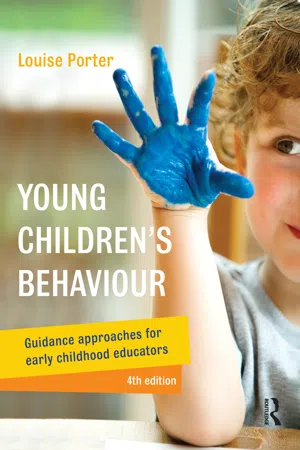
Young Children's Behaviour
Guidance approaches for early childhood educators
- 504 pages
- English
- ePUB (mobile friendly)
- Available on iOS & Android
About this book
'The book provides a comprehensive, yet practical discussion of guidance strategies that can be implemented in a variety of situations. These strategies promote a respect for children and their rights, enhance children's self-esteem, and help to foster pro-social skills. This book is a must-read for both students and practitioners who work with children and families.' - Dr Laura McFarland, School of Education, Charles Sturt University
Drawing on the latest research evidence, Young Children's Behaviour outlines the beliefs and values that underpin the guidance approach to managing the behaviours of children from birth to eight years of age. In contrast with rewards-and-punishment systems, guidance believes that children do not need incentives to behave well, but instead need skills. Rather than punishing them for lacking skills, guidance teaches young children self-regulation skills so that they can behave considerately.
The author provides practical strategies that both meet children's needs and safeguard the rights of surrounding adults and children. These methods include listening, being assertive, giving positive instructions, solving problems collaboratively, and coaching children to self-regulate their emotions and impulses. The text also offers advice on responding to many common challenges including separation distress, meltdowns, aggression, and social withdrawal. Finally, the book suggests how educators can provide educational and behavioural support for children with atypical development and describes how to foster effective relationships with parents whose children display challenging behaviours.
Dr Louise Porter powerfully argues that behaviour guidance is the most effective approach to working with young children and reflects the deepest values of early childhood education and care.
Frequently asked questions
- Essential is ideal for learners and professionals who enjoy exploring a wide range of subjects. Access the Essential Library with 800,000+ trusted titles and best-sellers across business, personal growth, and the humanities. Includes unlimited reading time and Standard Read Aloud voice.
- Complete: Perfect for advanced learners and researchers needing full, unrestricted access. Unlock 1.4M+ books across hundreds of subjects, including academic and specialized titles. The Complete Plan also includes advanced features like Premium Read Aloud and Research Assistant.
Please note we cannot support devices running on iOS 13 and Android 7 or earlier. Learn more about using the app.
Information
CHAPTER ONE
PRINCIPLES OF EARLY YEARS EDUCATION
Early education guidelines
- Every child is a unique person, who is constantly learning and can be resilient, capable, confident and self-assured.
- Children learn to be strong and independent through positive relationships.
- Children learn and develop well in enabling environments, in which their experiences respond to their individual needs and there is a strong partnership between practitioners and parents and/or carers.
- Children develop and learn in different ways and at different rates.
Table of contents
- Cover
- Half Title
- Title Page
- Copyright Page
- Dedication Page
- Contents
- Introduction
- 1 Principles of early years education
- 2 Principles of behaviour guidance
- 3 Needs
- 4 Understanding emotions
- 5 Providing a child-centred program: mastery and accomplishment
- 6 Meeting children’s basic needs: survival, safety and wellbeing
- 7 Meeting children’s need for self-esteem: competence and worth
- 8 Meeting children’s need to belong: care and connection
- 9 Meeting children’s need for autonomy: voice and choice
- 10 Influences on behaviour
- 11 Listening to children
- 12 Everyday guidance practices
- 13 Supporting children’s self-regulation
- 14 Solving persistent problems
- 15 Solutions to children’s emotional difficulties
- 16 Solutions to children’s social difficulties
- 17 Interventions for children with atypical development
- 18 Collaboration with parents
- Resources
- Notes
- Bibliography
- Index